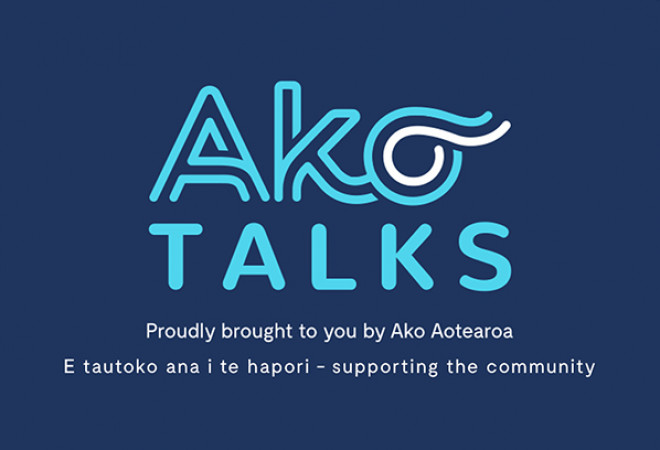
Ako Talks
Overview
Ako Talks, launched in May 2020, is a series of short topical presentations designed to help educators stay connected with leading tertiary educators during the pandemic.
The presentations contain many valuable learnings, insights and resources developed through our co-funded projects.
Key Points to Note:
The series is designed to connect busy tertiary-focused educators, managers, support staff, employers and agencies to free, high quality, evidence-based information and resources aimed at supporting success for all learners.
Damon Whitten, ALN Effective Practice Model Project Lead at Ako Aotearoa, discusses how integrating learner agency within language, literacy, and numeracy provision can prepare adults for liflelong learning - something that is vital in this time of radically changing national and global economic, technological, and health environments.
- 1 August 2020
Helen Lomax, Director of Ako Aotearoa, and Mike Styles, Dyslexia Practitioner, introduce the Dyslexia-Friendly Quality Mark.
- 23 September 2020
Mike Styles, Dyslexia Practitioner, discusses how learners with dyslexia can be supported within tertiary education, the benefits of this support to both learners and organisations along with the positive aspects of dyslexia.
- 23 September 2020
Associate Professor Philippa Seaton, Director of the Centre of Postgraduate Nursing Studies at University of Otago, discusses factors that organisations should consider during their recovery from sudden change.
- 17 June 2020
Selena Chan, Educational Developer at Ara Institute of Technology, talks about the framework they used to evaluate the rapid change their programmes underwent as a result of the Christchurch Earthquakes in 2011 and how it can be used to assist organisations to "take stock" following the Covid-19 lockdown.
- 19 May 2020
Develop skills and knowledge to recognise and support learners with dyslexia, and other neurodiverse conditions, to achieve their potential.